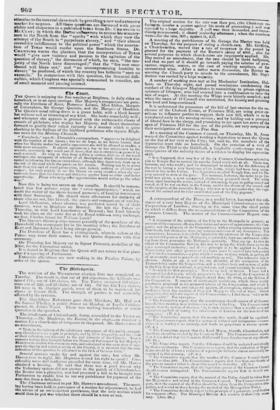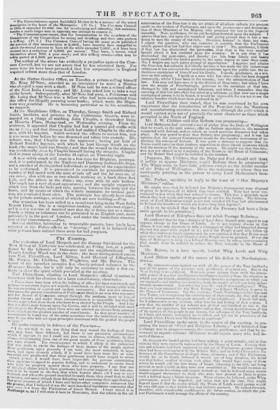A correspondent of the Tinus, in a useful letter, has
stated the subs stance of a very long Report of' the Municipal Commissioners on the Corporation of London ; showing at the same time the chief points on which it differs from the recommendations of the Comtnittee of the Common Council. The matter of the Commissioners' Report com- prises " A statement of the relation of the City to the Metropolis in general ; an account if the corporate officers, their duties and modes of appointment ; the Coin. parties Anti the property of the Corporatirm ; with a running commentary upon these heads, but abstaining from any recoimi enilations of any description. This commentary, however, is Ileci,loPy initiated to the existence of the Corporitioa as an isolated portion of the Metropolis, regulated by laws anti ordinance. differ. hg from those governing. the Metropolis generally. They say (p. 4) that the object f the Corporation Reform Act was to bring the whole town under the same municipal authority ; and if this principle is to be applied to London, Westminster and other (platters Of t he town must be erected into independert and ist•lated contratinities,—a plan whieli it seems to them would, in getting rid of an anomaly, tend to per petit rte ;mil multiply. an evil. The inference here is obvious. Again, at pp. 5 :mil 14, the absurdity of the navigation of tie Thames being tinder the Corporal ,,, and a distinct body and system of police in the City from that without, is pointed ma, and canoot certainly be denied. " Si much for first principles. Now let us look at details. I have Ind s document handed to me, which purports iii be a !Import of the Committee of the while Court of Common Council, dated June 16. 1836, on the Reform of the C..uporatiott. It consists of thirty.eight resolutions, which these worthy gentlemen propound as the proposed reform of the Corporation, and which is to lee the panacea for, and saftgli•tfli against, all coiruption, extravag mime, and profligacy, from the creation of Cog tool Magog to the end of time. But on compriiin; this with the report of the Commissioners, I find them wide as the poles astinder.' For exam ple- The Committee repot, that the constituency should consist of all freemen hottsehohlers residing in or within ...eve', nabs tit' the City. The Comnii•sioners relent, that the system of fretatwo is, in fact, no more than a troublesome and capricious method of taxing the inhalti tams of 1.0111iiill fur the hen,dit of the
comp ( P. 6.) " The Conitnittee report, that the twenty•five wards should be equalized.
The C'. ii report, that tile system Ili iodated amid independent commu. nities 1. e. wank) is all anomaly, atid tends to perpetuate a vicious System. (P. 4. ) " The Committee report that the Lord 31ayor, Sheriffs, Chamberlain, std Auditors, should he elected by the Common Hall. The Comniissionets report, thitt it is a defect that the Common 11111 SI1011111 hove the election of any officers. (I'. 19.)
"
The Canon:Nee report, that the Aldermen should he reelected periodically by their e.tristituents. The Golanissiotters report, that the reelection of 3119.s. trates would be at least a violation of a principle hitherto almost universally re- cognized in this country. (I. 8.) " The Committee report. that the number of the Common Council should not be lest than 200. The Commissioners report, that less than one-fourth ef the present number (that is abut (l0) would be desirable. (1'. 8.) " Committee report, th it the legislative power of the Common Countl should remain unimpaired. The Commissioners report that it should not. (1'. 8.) " The Committee report, that the control of the Police should betaken from the M rgistrates and vested in the Common Council. The Commissioners re- port, that the control of the Pollee should be t. ikon from the Corporation alto. gether, and vested in those having the control of the :Nletropolittin [Uwe.. " The Committee decidelly ohject to the principle of a pecuniary quabhcatioa for corporate office. The Alwaicipal Reform Act renders it absolutely neco. sary. (See. 28.) ." The Commissioners report Smithfield Market to be a nuisane, of the worst description in the heart of the Metropolis. (P. lb.) The Common Council in In)-ti expended 10,4361. 16s. 7d. in enlarging and extending this nuisance, besides a much larger sum in opposing any attempt to remove it. "The Commissionera report, that the remuneration to the nambers of the Committees of the Corporation for eating and drinking and their own pockets is trifling. (P. 7.) The Common Council having for many yeirs published the amount of this remuneration at 2,4001., have recently been compelled to admit the annual amount to have all the while exceeded 7,000/, aid have been shamed into a reduction of 3,000/. per annum ! They have, lu wever, voted themselves about 700/. a year since; and this trifling remunsration may be safely quoted at 4,500/. per annum."
The author of the above has evidently a prejudice against the Com- mon Council, but we are not aware that he has misstated facts. For some time we have been persuaded that few corporations in England required reform more than that of London.



























 Previous page
Previous page